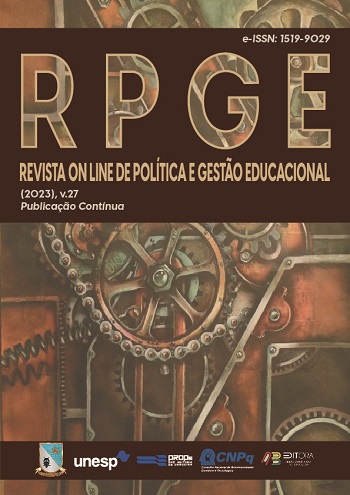As humanidades em uma universidade técnica
Da transferência de conhecimento à formação de um espaço educacional e humanitário
DOI:
https://doi.org/10.22633/rpge.v27i00.18060Palavras-chave:
Humanidades, Motivação, Educação, Formação da personalidadeResumo
Hoje em dia, os especialistas devem estar atentos em ambientes multiculturais, capazes de realizar o seu potencial criativo, e aprender constantemente novas habilidades. Recentemente, a especialização excessiva na educação levou a uma diminuição do tempo dedicado ao ensino de disciplinas do ciclo social e humanitário. O artigo analisa a motivação dos alunos das especialidades técnicas para cursar as humanidades e a transformação dessa motivação em diversos cursos. Para tanto, foi realizado um estudo empírico com base no Instituto Politécnico de Moscou. A amostra da pesquisa consistiu em alunos do Instituto Politécnico de Moscou que estudam em duas faculdades – tecnologia química e tecnologia da informação. Considerando os resultados, os educadores de humanidades devem não apenas transmitir conhecimento, mas também estabelecer padrões humanitários e culturais que estimulem o diálogo, não o monólogo, a tolerância, realizando uma análise histórica e ética de uma situação e desenvolvendo soluções efetivas que não conflitem com princípios humanísticos.
Downloads
Referências
BALGANOVA, E. Digitalization trends and risks professional education. Russian Journal of Education and Psychology, v. 12, n. 3, p. 19-31, 2021. DOI: 10.12731/2658-4034-2021-12-3-19-31.
BEZGODOV, D. N.; VOLOGIN, E. A.; SHILOVA, S. V. Philosophy as a basic discipline for technical areas of undergraduate and specialist studies. Higher education in Russia, v. 27, n. 3, p. 135-143, 2018.
BORODINA, T.; SIBGATULLINA, A.; GIZATULLINA, A. Developing creative thinking in future teachers as a topical issue of higher education. Journal of Social Studies Education Research, v. 10, n. 4, p. 226-245, 2019.
DONOHUE, D. Culture, cognition, and college: How do cultural values and theories of intelligence predict students’ intrinsic value for learning? Journal of Culture and Values in Education, v. 4, n. 1, 2020. DOI: 10.46303/jcve.2020.3.
GUSEVA, E. A.; PANFILOVA, M. I. On the discussion of university philosophy: what, how, why. Higher education in Russia, v. 28, n. 2, p. 69-78, 2019. DOI: 10.31992/0869-3617-2019-28-2-69-78.
HONEGGER, M. What Does “Education” Mean: Cultural Values in Educational Language. Journal of Culture and Values in Education, v. 3, n. 2, p. 42-53, 2020. DOI: 10.46303/jcve.2020.12.
ISAIKINA, M.; NEDOGREEVA, N.; POKOTILO, A. Role of metasubject educational results in learners’ professional self-consciousness formation. Russian Journal of Education and Psychology, v. 12, n. 3, p. 7-18, 2021. DOI: 10.12731/2658-4034-2021-12-3-7-18.
IVAKHNENKO, E. N.; KUZNETSOVA, N. I. On the benefits of rational simplicity: how to teach the humanities in technical universities? Higher education in Russia. n. 4, 2022. Available: https://cyberleninka.ru/article/n/o-polze-ratsionalnoy-prostoty-kak-prepodavat-gumanitarnye-distsipliny-v-tehnicheskih-vuzah. Access: 12 Dec. 2022.
IVYGINA, A.; PUPYSHEVA, E.; MUKHAMETSHINA, D. Formation of sociocultural competence among foreign students. Journal of Social Studies Education Research, v. 10, n. 4, p. 288-314, 2019.
KAYUMOVA, G. et al. Developing creative potential of a schoolchild by means of native language. Journal of Social Studies Education Research, v. 10, n. 1, p. 81-92, 2019.
KEEFER, N.; HAJ-BROUSSARD, M. Language in Educational Contexts. Journal of Culture and Values in Education, v. 3, n. 2, p. 1-12, 2020. DOI: 10.46303/jcve.2020.9.
KORABLEVA, O. N.; MITYAKOVA, V. N.; KALIMULLINA, O. V. Designing a decision support system for predicting innovation activity. Paper presented at the ICEIS 2020 - Proceedings of the 22nd International Conference on Enterprise Information Systems, v. 1, p. 619-625, 2020.
KOROTKEVICH E. R. Educational motivation of a modern student in the context of the theory of achieving goals. Educational resources and technologies, v. 3, n. 28, 2019. Available: https://cyberleninka.ru/article/n/uchebnaya-motivatsiya-sovremennogo-studenta-v-kontekste-teorii-dostizheniya-tseley. Access: 12 Dec. 2022.
KOSACHEVA, V. O. Motivation of students for learning and professional development. MNCO, v. 5, n. 96, p. 56-79, 2022. Available: https://cyberleninka.ru/article/n/motivatsiya-studentov-k-obucheniyu-i-professionalnomu-razvitiyu. Access: 12 Dec. 2022.
KUZNETSOVA, N. I. Unobtrusive pedagogy. Science as a public good: Sat. articles. Nauch. ed. and comp. L.V. Shipovalova, I.T. Karsavin: In 7 vols. M.: ROIFN, v. 7, n. 6, p. 88–91, 2020. Available: http://rshps.ru/books/congress2020t6.pdf. Access: 12 Dec. 2022.
LOBANOVA, Yu. V.; BAZHENOVA, N. V. Ethics of dialogue in modern education. Modern Science: Actual Problems of Theory and Practice. Series: Cognition, v. 5, n. 80, p. 129-131, 2018.
MEDVEDEVA, G.; MITINA, G. Professional development of higher education institutions pedagogical workers in the context of the federal project «New Opportunities for Everyone». Russian Journal of Education and Psychology, v. 12, n. 3, p. 32-47, 2021. DOI: 10.12731/2658-4034-2021-12-3-32-47.
MILOVANOVA, G. V.; KULYASHOVA, N. M.; SHEMYAKINA, E. Yu. Comparative analysis of motivational characteristics of students at different stages of education. Concep, v. 6, p. 122-143, 2022.
OTTS, E. V.; PANOVA, E. P.; LOBANOVA, Yu. V. A study of the long-term effectiveness of training in a pandemic. 2021
POGOSYAN, V. Institutional Reconstruction: Complete Alteration? In: Economic and Social Development ESD-2017 (Book of Proceedings). 25th International Scientific Conference on Economic and Social Development / 17th International Social Congress (Moscow, Russia, Oct. 30-31, 2017). Varazdin, Croatia: Varazdin Development and Entrepreneurship Agency, 2017. p. 931-936.
POGOSYAN, V. Updating social theory: Redefinition of modernization. Wisdom, v. 19, n. 3, p. 182-193, 2021. DOI: 10.24234/wisdom.v19i3.486.
SAENKO, N. et al. Understanding in the context of distance learning. In: TOROPOVA, E. V. (Eds.). Man, Society, Communication. European Transactions in the Social and Behavioral Sciences, 2021. DOI: 10.15405/epsbs.2021.05.02.98. v. 108, p. 772-778.
Downloads
Publicado
Como Citar
Edição
Seção
Licença
Copyright (c) 2023 Revista on line de Política e Gestão Educacional

Este trabalho está licenciado sob uma licença Creative Commons Attribution-NonCommercial-ShareAlike 4.0 International License.
Manuscritos aceitos e publicados são de propriedade da Revista on line de Política e Gestão Educacional. É vedada a submissão integral ou parcial do manuscrito a qualquer outro periódico. A responsabilidade do conteúdo dos artigos é exclusiva dos autores. É vedada a tradução para outro idioma sem a autorização escrita do Editor ouvida a Comissão Editorial Científica.











